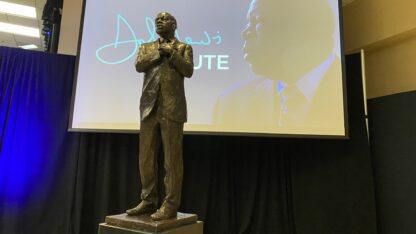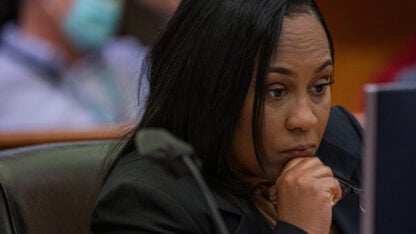Super Soaker Inventor Now Engineers Batteries At Atlanta Lab
Chances are you’ve heard of the Super Soaker – the colorful water gun that lets you power spray just about anyone in your path.
Since it debuted in the early 90s, it’s generated more than $1 billion in global sales.
The man who invented the Super Soaker is Lonnie Johnson. He’s lived in Atlanta for the last few decades and holds over 100 patents for other projects.
When Johnson first came up with the idea for the Super Soaker, he was working as an engineer at the Jet Propulsion Laboratory for NASA’s Galileo Mission, but that was his day job.
At night, Johnson would tinker around with a prototype for a water gun.
Following the success of the Super Soaker, Johnson, who is from Mobile, Alabama, moved to Atlanta to be closer to family and set up his own research lab in the Sweet Auburn neighborhood near public housing units like Grady and Capitol Homes.
He said that was no accident.
“It’s a lot of poverty in this area. My intent was to come in and set up a company to manufacture batteries and create jobs, ” Johnson said. “The challenge we faced was that the battery technology was not ready for commercialization – it was not as mature as we had been led to believe, and so we had to refocus on research.”
Since 2001, Johnson has been in his lab.
The lab isn’t like anything you’ve seen in science-fiction films.
There are no beakers filled with strange-colored liquids or bubbling cauldrons with unknown, possibly lethal, chemicals.
But there is a constant hum echoing throughout the 20,000-square-foot space and a lot of machines with names that are somewhat hard to pronounce.
“This machine is called an X-ray diffractometer,” Johnson said. “With it we can actually look at crystalline structure so with this machine we can actually look at the particles and tell what kind of crystals they are, what crystal structure and so forth so it gives a little bit more insight. So we use different information from different machines to understand the complete picture of what we have.”
Johnson may be best known for inventing the Super Soaker, but his real passion project is batteries.
Machines like the X-ray diffractometer help him and his team of more than 20 engineers and technicians get an up-close view while they work on a technology to make tiny batteries that Johnson said are a “game changer.”
“Once we’re successful, these batteries will be able to hold three times the energy of lithium ion batteries ─ in the same size and weight package,” he said. “Your cellphones ─ you’ll be able to talk a lot longer without recharging. And even electric vehicles, you’ll be able to drive a lot farther. And I think a lot of the anxiety over range that causes people to purchase gasoline cars instead of electric cars, I think a lot of that will go away.”
In the lab, there’s an electronic microscope, a laser-cutting machine and an area to test the batteries.
Johnson points out a glove box where the engineers and technicians handle the batteries.
“So you may see these things on TV sometimes and in sci-fi movies and things like that – well these are different from the sci-fi movie where you’ve got something dangerous inside the box,” he said. “The idea here is that the lithium materials that we use are very sensitive to ambient air so we have to protect lithium from the air. So this is really to protect the lithium from us as opposed to us from the lithium.”
Many of the people who work in Johnson’s lab are African-American. From the lab’s CEO to the technicians, which makes sense because earlier he talked about operating a lab in this area to generate more jobs for the local community.
He said it’s also a way for him, an African-American inventor, to reach back to young people interested in science like he was at a young age.
“My parents, and my neighbors and teachers tolerated me on some of the kooky, crazy things I did, ” Johnson said with a laugh. “I got a lot of feedback, a lot of positive feedback and encouragement. And one example was I was mixing rocket fuel in my mother’s kitchen and having a catch fire.”
Despite their tolerance of his crazy, kitchen experiments, Johnson said there weren’t many people in his life who actually knew a whole lot about science.
When he was a high school student he wanted to build his first robot, but he had to use research from his local library to figure out how to put it together.
Recently he led a robotics team of foster children to a science fair at the White House.
“What I’m doing now with the robotics program is trying to start with kids early on … get them interested in robotics and then stick with them all the way through high school,” Johnson said.
Johnson said mentoring to youth, especially African-Americans, is is way of reaching back to kids who are interested in science like he was early in his life and he believes technology is an important way to do that.
“Some of the problems that I see today are problems that I experienced when I was a kid in the segregated South growing up,” Johnson said. “Somehow we need to have a fundamental change. I think technology will provide us a tool to use to bring about that change. But the change is a social change; it’s a community change. It’s an attitude change.”
Johnson acknowledges these are ambitious goals, but he’s encouraged by so much of the change that he’s already seen in the neighborhood around his lab and the Atlanta tech scene as a whole.
“I take exception to a lot of notions that people have that the only other main center of technology is Silicon Valley,” he said. “I think Atlanta has a lot to offer and I think we’re starting to come into our own. I think we’re beginning to appreciate the process of incubating technology.”
While Johnson talks about the future of technology, there are reminders all over his office of his famous invention of the past.
When you first walk in there’s a huge photo hanging over the front desk of at least two dozen kids, all in various states of glee, pointing neon-colored Super Soakers at the camera.
Further back in Johnson’s office there’s a conference room length table that holds many a childhood memory. There are Super Soakers of nearly every shape, size and color and Nerf guns galore, including a special Iron Man version. There’s also a lesser known invention called the Whacky Water Ball. All of these toys are based on patents held by Johnson.
Johnson originally licensed the Super Soaker to a company called Larami that was later bought by giant toy maker, Hasbro, which has manufactured everything from Monopoly to Mr. Potato Head.
But he said these inventions are part of a past life.
In 2013 Johnson became locked in a financial dispute with Hasbro over what he said were unpaid royalties for some of his inventions.
At the end of that year Johnson’s company was ultimately awarded nearly $73 million.
Johnson said a lot of that money has gone toward keeping the lab going.
“Prior to the suit I was deep in debt between paying off the attorneys who fought the case … paying off the federal government in terms of taxes and paying past debt,” he said.
Would he ever make another Super Soaker? Another toy that rakes in the profits?
“My focus right now is not so much on the toys,” Johnson said. “I’m more focused on energy technology because I think that’s a problem that’s really important and one that needs to be addressed.”
Johnson’s just come from a meeting with his team about a major development in their research. He said that if preliminary tests are true everything could be smooth sailing from here, and perhaps once again Johnson will be the man behind a well-known American invention.








